Book 1_U1_Reading 1
U1 Reading 1 with Translation
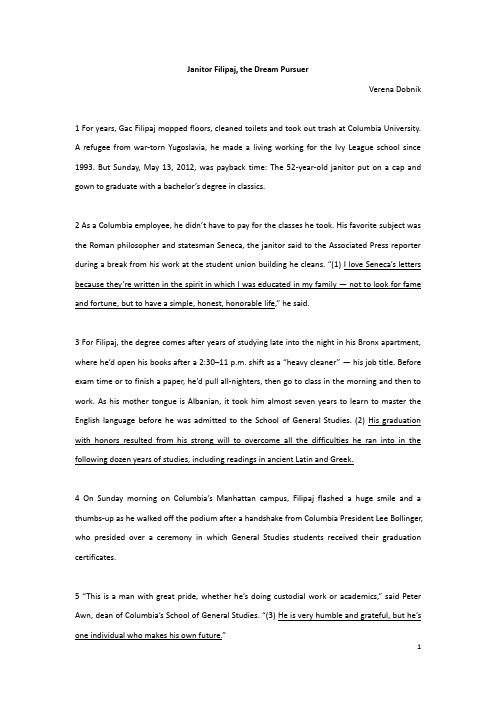
Janitor Filipaj, the Dream PursuerVerena Dobnik1 For years, Gac Filipaj mopped floors, cleaned toilets and took out trash at Columbia University.A refugee from war-torn Yugoslavia, he made a living working for the Ivy League school since 1993. But Sunday, May 13, 2012, was payback time: The 52-year-old janitor put on a cap and gown to graduate with a bachelor’s degree in classics.2 As a Columbia employee, he didn’t have to pay for the classes he took. His favorite subject was the Roman philosopher and statesman Seneca, the janitor said to the Associated Press reporter during a break from his work at the student union building he cleans. “(1) I love Seneca’s letters because they’re written in the spirit in which I was educated in my family — not to look for fame and fortune, but to have a simple, honest, honorable life,” he said.3 For Filipaj, the degree comes after years of studying late into the night in his Bronx apartment, where he’d open his books after a 2:30–11 p.m. shift as a “heavy cleaner” — his job title. Before exam time or to finish a paper, he’d pull all-nighters, then go to class in the morning and then to work. As his mother tongue is Albanian, it took him almost seven years to learn to master the English language before he was admitted to the School of General Studies. (2) His graduation with honors resulted from his strong will to overcome all the difficulties he ran into in the following dozen years of studies, including readings in ancient Latin and Greek.4 On Sunday morning on Columbia’s Manhattan campus, Filipaj flashed a huge smile and a thumbs-up as he walked off the podium after a handshake from Columbia President Lee Bollinger, who presided over a ceremony in which General Studies students received their graduation certificates.5 “This is a man with great pride, whether he’s doing custodial work or academics,” said Peter Awn, dean of Columbia’s School of General Studies. “(3) He is very humble and grateful, but he’s one individual who makes his own future.”6 It’s been a long road for Filipaj who fled to the United States in 1992, leaving behind his parents and siblings on a family farm in Montenegro, then a Yugoslav republic. Filipaj has always been a dedicated student. When he was living in Montenegro and working on his family farm, he attended the Law College in Belgrade as a part-time student, but he was unable to finish his degree due to the cruel civil war and had to leave his homeland during the last year of his studies.7 At first in New York, his uncle in the Bronx offered him shelter while he worked as a restaurant busboy. “I asked people, which are the best schools in New York?” he said. Since Columbia topped his list, “I went there to see if I could get a job.” Filipaj was accepted at Columbia as a janitor.8 Part of his $22-an-hour janitor’s pay still goes back to his brother, sister-in-law and two kids in Montenegro. Filipaj has no computer, but he bought one for the family, whose income comes mostly from selling milk. Filipaj also saves by not paying for a cellphone; he can only be reached via landline.9 During the interview with the Associated Press, Filipaj didn’t show the slightest regret or bitterness about his hard life. Instead, he cheerfully described encounters with surprised younger students who wondered why their classmate was cleaning up after them. “They say, ‘Aren’t you...?’” he said with a grin.10 His ambition is to get a master’s degree, maybe even a Ph.D., in Roman and Greek classics. He hopes to become a teacher someday, while translating his favorite classics into Albanian.11 For now, he’s trying to get “a better job,” maybe as supervisor of custodians or something similar, at Columbia if possible. He’s not interested in furthering his studies to make more money. “(4) The richness is in me, in my heart and in my head, not in my pockets,” said Filipaj, who is now an American citizen. 12 Soon after, the spirited, 5-foot-4 janitor picked up a broom and dustpan and went back to work.清洁工菲利帕:一位追梦人弗里那·多布尼克1 多年以来,盖茨·菲利帕一直在哥伦比亚大学做拖地板、打扫厕所和倒垃圾的工作。
高中英语Book1U1第一单元课文内容概括
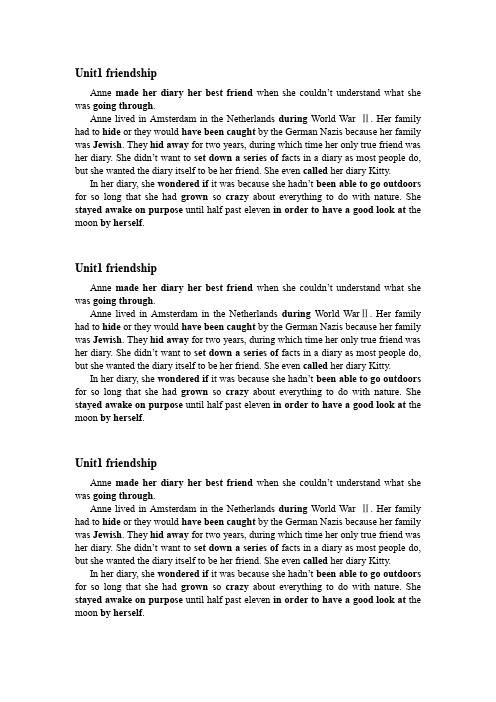
Unit1 friendshipAnne made her diary her best friend when she couldn’t understand what she was going through.Anne lived in Amsterdam in the Netherlands during World War Ⅱ. Her family had to hide or they would have been caught by the German Nazis because her family was Jewish. They hid away for two years, during which time her only true friend was her diary. She didn’t want to set down a series of facts in a diary as most people do, but she wanted the diary itself to be her friend. She even called her diary Kitty.In her diary, she wondered if it was because she hadn’t been able to go outdoors for so long that she had grown so crazy about everything to do with nature. She stayed awake on purpose until half past eleven in order to have a good look at the moon by herself.Unit1 friendshipAnne made her diary her best friend when she couldn’t understand what she was going through.Anne lived in Amsterdam in the Netherlands during World WarⅡ. Her family had to hide or they would have been caught by the German Nazis because her family was Jewish. They hid away for two years, during which time her only true friend was her diary. She didn’t want to set down a series of facts in a diary as most people do, but she wanted the diary itself to be her friend. She even called her diary Kitty.In her diary, she wondered if it was because she hadn’t been able to go outdoors for so long that she had grown so crazy about everything to do with nature. She stayed awake on purpose until half past eleven in order to have a good look at the moon by herself.Unit1 friendshipAnne made her diary her best friend when she couldn’t understand what she was going through.Anne lived in Amsterdam in the Netherlands during World War Ⅱ. Her family had to hide or they would have been caught by the German Nazis because her family was Jewish. They hid away for two years, during which time her only true friend was her diary. She didn’t want to set down a series of facts in a diary as most people do, but she wanted the diary itself to be her friend. She even called her diary Kitty.In her diary, she wondered if it was because she hadn’t been able to go outdoors for so long that she had grown so crazy about everything to do with nature. She stayed awake on purpose until half past eleven in order to have a good look at the moon by herself.。
人教版高中英语选修一第一单元U1reading
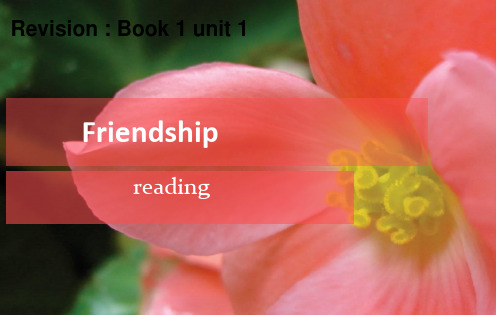
核心提问
Anne didn’t dare open the window when the moon was bright. That’s because____________. A. they might be discovered B. her family mHigehrtfabmeildyiswtausrJbewedish so they had to C. it was very choildde or they would be caught by the D. a thief mightGgeemtainntNoazthise. room.
C. The passage maily tells that Anne were crazy about the nature when they hid.
D. The passage maily tells that Anne made her diary her best friend during the hiding time.
scene face to face. At that moment she was held 9e_n_t_i_r_e_ly
(entire) in the power of nature. What a poor and brave girl
she was! In her mind, she thought nature was one thing
that really must 10 b_e__e_x_p__e_r_ie_n__c_e_d_(experience).
主旨大意
What ’the main idea of the passage?
A.The passage maily tells that Anne’s family was Jewish so they were caught by the German Nazis.
U1 Reading 1 with Translation
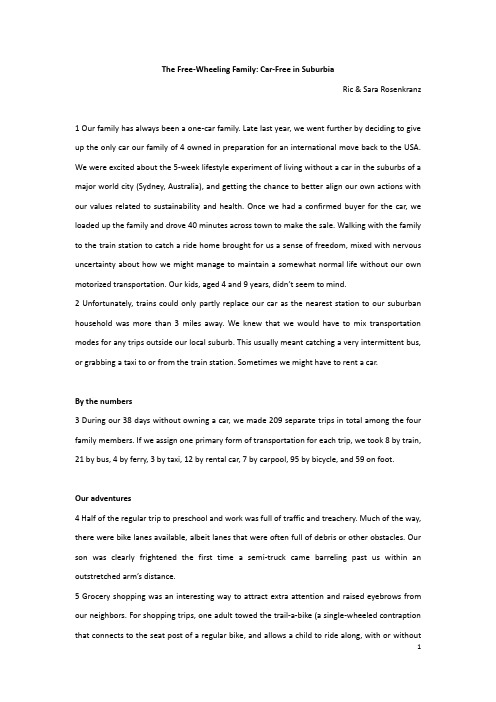
The Free-Wheeling Family: Car-Free in SuburbiaRic & Sara Rosenkranz1 Our family has always been a one-car family. Late last year, we went further by deciding to give up the only car our family of 4 owned in preparation for an international move back to the USA. We were excited about the 5-week lifestyle experiment of living without a car in the suburbs of a major world city (Sydney, Australia), and getting the chance to better align our own actions with our values related to sustainability and health. Once we had a confirmed buyer for the car, we loaded up the family and drove 40 minutes across town to make the sale. Walking with the family to the train station to catch a ride home brought for us a sense of freedom, mixed with nervous uncertainty about how we might manage to maintain a somewhat normal life without our own motorized transportation. Our kids, aged 4 and 9 years, didn’t seem to mind.2 Unfortunately, trains could only partly replace our car as the nearest station to our suburban household was more than3 miles away. We knew that we would have to mix transportation modes for any trips outside our local suburb. This usually meant catching a very intermittent bus, or grabbing a taxi to or from the train station. Sometimes we might have to rent a car.By the numbers3 During our 38 days without owning a car, we made 209 separate trips in total among the four family members. If we assign one primary form of transportation for each trip, we took 8 by train, 21 by bus,4 by ferry, 3 by taxi, 12 by rental car, 7 by carpool, 95 by bicycle, and 59 on foot.Our adventures4 Half of the regular trip to preschool and work was full of traffic and treachery. Much of the way, there were bike lanes available, albeit lanes that were often full of debris or other obstacles. Our son was clearly frightened the first time a semi-truck came barreling past us within an outstretched arm’s distance.5 Grocery shopping was an interesting way to attract extra attention and raised eyebrows from our neighbors. For shopping trips, one adult towed the trail-a-bike (a single-wheeled contraption that connects to the seat post of a regular bike, and allows a child to ride along, with or withoutpedaling), while another adult towed a trailer loaded up with reusable grocery bags as our daughter rode solo. Pulling the trailer uphill while loaded down with groceries was quite a challenge.6 One of the most arduous parts came as we were leaving the country. We had to pack a lot of luggage. Thus, we each had two large suitcases, plus a backpack. Trying to get that much luggage on and off a bus, and then on and off a very crowded train while minding young children was truly a stressful experience.The good aspects of this lifestyle7 The good aspects of living without a car included having no car maintenance or car insurance, and not having to worry about break-ins, theft, or crashes. We could relax on public transport, and not have to worry about speeding tickets or tolls. We achieved better physical fitness from extra walking and cycling, and gained a new perspective of our suburbs, the city, and its residents.8 One of the best aspects was special time with our son. For instance, each morning that we rode the trail-a-bike, we could chat about the day ahead and the beauty of the environment around us.The not-so-good aspects of this lifestyle9 There were safety concerns with regard to cycling in traffic, being in strange train stations, and waiting at bus stops. Another drawback was the amount of time needed for two very busy adults (planning the trips, waiting for buses and trains, and often going far out of the way to get where we wanted to go). With that came less freedom to roam, less independence.Lessons learned from the experiment10 We consider our family’s experiment a great learning experience. Since our return to the USA, we have purchased a new fuel-efficient automobile, but have continued to follow many of the practices we adopted while living car-free. We drive less than we used to, commute by bike or foot more, combine trips, and consider whether or not trips by car are necessary at all. We have even gone grocery shopping with our bike trailer. We intend to continue our family’s efforts tolive more sustainably, while simultaneously advocating for more supportive policies to reduce dependence on automobiles through initiatives such as additional bike lanes, walking paths, and better public transportation options.自由自在的一家人:郊区的无车生活瑞克和萨拉·罗森克兰茨1一直以来,我们家只有一辆车。
高中英语课件Book 1_U1_Welcome to the unit

牛津高中英语教学设计单元:Unit 1 School life板块:Welcome to the unitThoughts on the design:Welcome to the unit 这一板块的主要功能是激活学生与单元话题有关的已有知识,引导学生联系自己的亲身经历进行相关话题的讨论。
生动的画面为该模块的语言学习设置了生动的语言情景,能有效地引起学生对话题的兴趣,调动学生的学习积极性。
Teaching aims:1.to introduce and develop the theme of School Life;2.to get more specific information about Senior One students who have just stepped into a freshnew life;3.to enable students to get more chances of practicing listening and speaking skills;4.to guarantee effective communication among students.Teaching procedures:Step One——Oversea Conversation + Completing Timetables*Chinese student-“What you will be doing at 8 o'clock Saturday morning?*British student-“Sleeping like a log.” (*a sigh of surprise of Chinese Student)[设计说明]通过此对话凸显中西方学校生活差异,伴随而来的Timetable的比较进一步深入话题,从而引出对预设话题Dreaming of colorful school life的思考。
U1 Reading 1 with Translation上课讲义
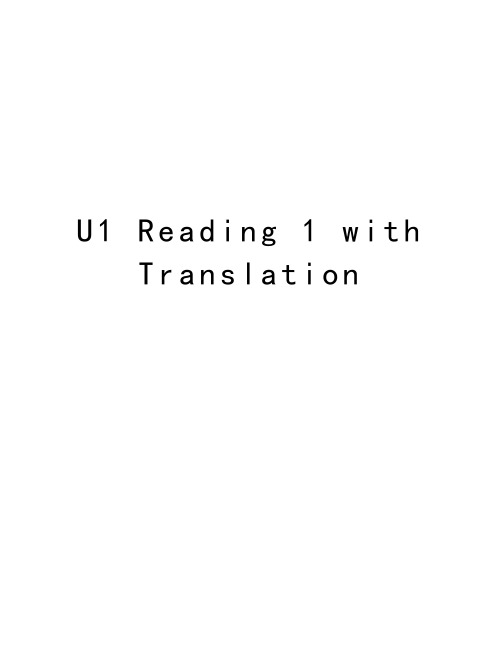
U1R e a d i n g1w i t h T r a n s l a t i o nJanitor Filipaj, the Dream PursuerVerena Dobnik1 For years, Gac Filipaj mopped floors, cleaned toilets and took out trash at Columbia University. A refugee from war-torn Yugoslavia, he made a living working for the Ivy League school since 1993. But Sunday, May 13, 2012, was payback time: The 52-year-old janitor put on a cap and gown to graduate with a bachelor’s degree in classics.2 As a Columbia employee, he didn’t have to pay for the classes he took. His favorite subject was the Roman philosopher and statesman Seneca, the janitor said to the Associated Press reporter during a break from his work at the student union building he cleans. “(1) I love Seneca’s letters because they’re written in the spirit in which I was educated in my family — not to look for fame and fortune, but to have a simple, honest, honorable life,” he said.3 For Filipaj, the degree comes after years of studying late into the night in his Bronx apartment, where he’d open his books after a 2:30–11 p.m. shift as a “heavy cleaner” —his job title. Before exam time or to finish a paper, he’d pull all-nighters, then go to class in the morning and then to work. As his mother tongue is Albanian, it took him almost seven years to learn to master the English language before he was admitted to the School of General Studies. (2) His graduation with honors resulted from his strong will to overcome all the difficulties he ran into in the following dozen years of studies, including readings in ancient Latin and Greek.4 On Sunday morning on Columbia’s Manhattan campus, Filipaj flashed a huge smile and a thumbs-up as he walked off the podium after a handshake from Columbia President Lee Bollinger, who presided over a ceremony in which General Studies students received their graduation certificates.5 “This is a man with great pride, whether he’s doing custodial work or academics,” said Peter Awn, dean of Columbia’s School of General Studies. “(3) He is very humble and grateful, but he’s one individual who mak es his own future.”6 It’s been a long road for Filipaj who fled to the United States in 1992, leaving behind his parents and siblings on a family farm in Montenegro, then a Yugoslav republic. Filipaj has always been a dedicated student. When he was living in Montenegro and working on his family farm, he attended the Law College in Belgrade as a part-time student, but he was unable to finish his degree due to the cruel civil war and had to leave his homeland during the last year of his studies.7 At first in New York, his uncle in the Bronx offered him shelter while he worked asa restaurant busboy. “I asked people, which are the best schools in New York?” he said. Since Columbia topped his list, “I went there to see if I could get a job.” Filipaj was accepted at Columbia as a janitor.8 Part of his $22-an-hour janitor’s pay still goes back to his brother, sister-in-law and two kids in Montenegro. Filipaj has no computer, but he bought one for the family, whose income comes mostly from selling milk. Filipaj also saves by not paying for a cellphone; he can only be reached via landline.9 During the interview with the Associated Press, Filipaj didn’t show the slightest regret or bitterness about his hard life. Instead, he cheerfully described encounters with surprised younger students who wondered why their classmate was cleaning up after them. “They say, ‘Aren’t you...?’” he said with a grin.10 His ambition is to get a master’s degree, maybe even a Ph.D., in Roman and Greek classics. He hopes to become a teacher someday, while translating his favorite classics into Albanian.11 For now, he’s trying to get “a better job,” maybe as supervisor of custodians or something similar, at Columbia if possible. He’s not interested in furthering his studies to m ake more money. “(4) The richness is in me, in my heart and in my head, not in my pockets,” said Filipaj, who is now an American citizen. 12 Soon after, the spirited, 5-foot-4 janitor picked up a broom and dustpan and went back to work.清洁工菲利帕:一位追梦人弗里那·多布尼克1 多年以来,盖茨·菲利帕一直在哥伦比亚大学做拖地板、打扫厕所和倒垃圾的工作。
Book 1_U1_语法-定语从句1
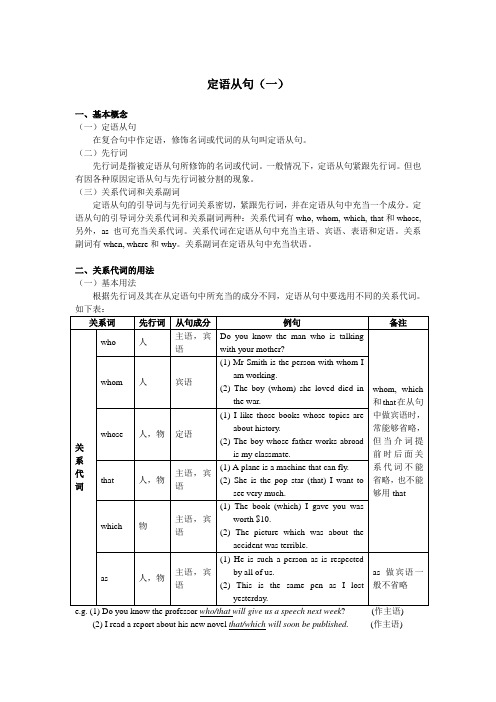
定语从句(一)一、基本概念(一)定语从句在复合句中作定语,修饰名词或代词的从句叫定语从句。
(二)先行词先行词是指被定语从句所修饰的名词或代词。
一般情况下,定语从句紧跟先行词。
但也有因各种原因定语从句与先行词被分割的现象。
(三)关系代词和关系副词定语从句的引导词与先行词关系密切,紧跟先行词,并在定语从句中充当一个成分。
定语从句的引导词分关系代词和关系副词两种:关系代词有who, whom, which, that和whose, 另外,as也可充当关系代词。
关系代词在定语从句中充当主语、宾语、表语和定语。
关系副词有when, where和why。
关系副词在定语从句中充当状语。
二、关系代词的用法(一)基本用法根据先行词及其在从定语句中所充当的成分不同,定语从句中要选用不同的关系代词。
如下表:e.g. (1) Do you know the professor who/that will give us a speech next week? (作主语)(2) I read a report about his new novel that/which will soon be published. (作主语)(3) The plan that/which they argued about was settled at last. (作宾语)(4) This is the new secretary (who/whom/that)I would like to introduce to you. (作宾语)(5) The soldier whose legs were badly wounded was operated on without delay. (作定语)注意:关系代词在定语从句中充当宾语时能够省略,充当主语时则不能。
(见上例(3)(4))(二)关系代词that代替which的一些情况which, that 在代替物时,一般能够通用。
选择性必修一Unit1重要短语和词形梳理

选修一U1 PEOPLE OF ACHIEVEMENT重点短语和词形Section1 Reading and Thinking(P1 ~ P3)1. a man of value有价值的人2.descriptive words描述性的词语3.form a good impression of ...对……产生好的印象4.Nobel Prize for Medicine诺贝尔医学奖5.award sb sth = award sth to sb授予某人某物6. a crucial treatment for malaria至关重要的抗疟疾药物7.die from死于8. a committed and patient scientist坚定有耐心的科学家9.the China Academy of Traditional Chinese Medicine中国中医科学院10.w ith the objective of 以……为目标11.m edical properties药用性12.s how promise in the fight againstmalaria有望战胜疟疾13.g et stuck陷入僵局14.a cknowledge defeat认输15.b y chance偶然16.i nsist on doing sth坚持做某事17.t est the medicine on sb在某人身上测试药物18.u pon hearing that一听到……19.s cientific research科学研究20.o ther than除了Section1 Reading and Thinking(P4)21.b e quite distinct from one another彼此完全不同22.s tand up to经得起;抵抗23.w ear and tear磨损;损耗24.c ommit oneself to sth全身心投入到某事中25.c ome to a conclusion得出结论26.I t strikes / hits / occurs to sb that ...某人突然想到……27.f ellow countrymen同胞Section2 Discovering Useful Structures(P5)28.b e in power当权;执政29.b eyond one’s control超出某人的控制30.u nder construction在建设中31.w ith the help of sb在某人的帮助下32.a flow chart流程图33.C hinese herbal medicine中草药;中药34.work best for my cough对我的咳嗽效果最好Section3 Using Language(P6 ~ P9)35.m ake great advancement in在……取得重大进步36.o nline shopping网购37.g ive one’s opinions on sth给出关于某事的意见38.H ang on a second.等一下。
- 1、下载文档前请自行甄别文档内容的完整性,平台不提供额外的编辑、内容补充、找答案等附加服务。
- 2、"仅部分预览"的文档,不可在线预览部分如存在完整性等问题,可反馈申请退款(可完整预览的文档不适用该条件!)。
- 3、如文档侵犯您的权益,请联系客服反馈,我们会尽快为您处理(人工客服工作时间:9:00-18:30)。
School Life in the UK
Words preview
attend earn challenging extra prepare devote average
difficult in an interesting way that tests your ability make something ready go to more than usual
Find out the key sentences of the paragraph.
Skimming –key sentences
If you buy some well-made clothes, you can save money because they can last longer. They look good even after they have been washed many times. Sometimes some clothes cost more money, but it does not mean that they are always better made, or they always fit better. In other words, some less expensive clothes look and fit better than more expensive clothes.
2. Why do we scan a text? How do we do it?
Reading strategies:
Skimming 略读 scanning 扫读 、寻读
Reading strategy -- Skimming
1. We skim a text when we want to get a general idea of what it is about. 2. the title the first and last sentences of each paragraph the first and last paragraphs Charts pictures
Para 4.
used to do sth 过去常常做某事(现在不做) be used to do 被用来做 be/get/become used to doing sth/sth 习惯于、开始习惯于做某事 there used to be sth 某地过去有某物
1.I used to go to the cinema a lot, but I never get the time now. 2.In our school, candles are used to give light when electricity is cut off. 3.I am used to traveling by air and only on one occasion have I ever felt frightened. 4.There used to be a swimming pool in our town.
The best way to earn respect was to _________and___________.
I think the best way to protect the environment is to plant more trees. 周末去公园野餐听起来像是个不错的主意。 我认为保护环境的最好方法是多种树。 Going to the park for a picnic at the weekend sounds like a good idea.
knowledge is Because____________ power (知识就是力量
Devote…to…
• devote (time, energy,oneself, one’s life) to sth/doing sth
• He devoted himself to writing. 他专心写作 • He has devoted his whole life to science. 他把一生都献给了科学。 • Doctors devote much time to their patients
这里不许抽烟。
Smoking is not allowed here. 眼见为实 Seeing is believing.
玩电脑游戏, 收集邮票以及绘画是他的爱好。
Playing computer games, collecting stamps as well as drawing pictures are his hobbies.
give most of your time and energy to sth
usual or common get something because you have done something good
Words preview
assembly improve relax
to rest or become calm
The man reading the newspaper attended the meeting _______________(参加了会议), attend to but he didn’t ___________ (注意听) what others were talking at all.
Paragraph 4 - 6 Paragraph 7
Paragraph 8
homework and subjects __________ _________ food activities British ____ and her_________ feeling and hope Her _________________
The good feeling you have when you get what you want giving joy; pleasant to get better a meeting of the teachers and students in the school to discuss sth.
• 2. Because there were different students in some classes.
• 3. Because all the homework was in English.
4.The teachers gave her much encouragement . 5.She used English every day and spent an hour each day reading English books in the library. 6.They like to eat desserts at the end of dinner.
Reading strategy -- scanning
1. We scan the text when we want to find certain information in a text quickly. 2. key words and phrases dates numbers
Scanning -- to get certain information
Part A 1. She thought of it was a very enjoyable and exciting experience . 2. Line 24-25 3. Manchester
Part C1& C2
• FTTFFF • 1. They should devote themselves to study.
attend 3. Who is going to ____________ the concert with me tomorrow?
4. Won’t you ________ us ______ the join in tennis match?
Para 2:
Attending assembly:
Skim the text
Find out the main idea of each paragraph.
Paragraph 1
Paragraph 2 Paragraph 3
School _______________ hours
assembly Attending_____________
_________ and classmates ____________ teachers
2. be happy with sth be happy to do sth 3. later than usual 比往常要迟 He got up a little earlier than usual. as … as usual
Para 2.:
On the first day, all the students went to attend assembly.
Attend, join, join in, take part in
1. He _______ the army in the year of 2003. joined 2. How many of you will take part in the ____________ coming sports meeting?
Skimming practice
All living things on the earth need other living things to live. Nothing lives alone. Most animals must live in a group, and even a plant grows close together with others of the same kind. Sometimes one living thing kills another, one eats and the other is eaten. Each kind of life eats another kind of life in order to live, and together they form a food chain(食物链)。Some food chains become broken up if one of the links disappears.
